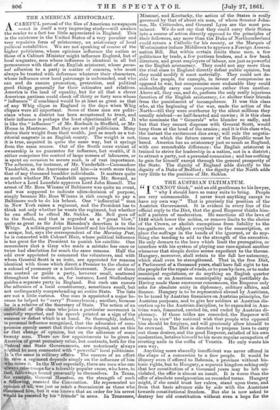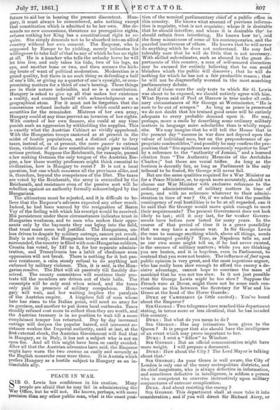THE AUSTRIAN ULTIMATUM.
j CANNOT think," said an old gentleman to his lawyer, "why I should have so many suits to bring. People are very unreasonable. I never want anything except to have my own way." That is precisely the position of the Austrian Government. It is evident in every line of the official reply to the Diet, that the good Emperor thinks him- self a pattern of moderation. He sanctions all the laws of 1848 which lower the nobles, or remove limits to the choice of the Crown, or abolish exemptions from liability to the tax-gatherer, or subject everybody to the conscription, or place the suffrage in the bands of the ignorant, or do any- thing else tending to add to the strength of the executive. He only demurs to the laws which limit the prerogative, or interfere with his system of playing one race against another whenever that simple device seems expedient to the throne. Hungary, moreover, shall retain to the full her autonomy, which shall even be strengthened. That is, the free Diet, a Parliament of a thousand years, shall have full right to tax the people for the repair of roads, or to pass by-laws, or to make municipal regulations, or do anything an English quarter sessions or an American municipality might justifiably do. Having made these enormous concessions, the Emperor only asks for absolute unity in diplomacy, military affairs, and finance. Hungary is to be represented abroad by Austrians, to be taxed by Austrian financiers on Austrian principles, for Austrian purposes, and to give her soldiers at Austrian dis- cretion up to the Austrian discipline, to be expended in Aus- trian wars, fomented, carried on, and ended by Austrian di- plomacy. If those trifles are conceded, the Emperor will "keep in view" the national wish that people who opposed him should be forgiqen, and will graciously allow himself to be crowned. The Diet is directed to prepare laws to carry out those desires, and the good Emperor, satisfied of his own moderation, betakes himself to his more regular occupation of riveting nails in the coffin of Venetia. He only wants his own way.
Anything more absurdly insufficient was never offered in the shape of a concession to a free people. It would be illusory even if offered to Bohemia, a province without his- toric rights, but to Hungary, a separate kingdom asking only that her constitution of a thousand years may be left un- violated, the offer is almost an insult. It is worse than the offer of absolute amalgamation on recorded terms. Hungary might, if she could trust her rulers, stand upon them, and from that basis advance side by side with the Austrians towards constitutional freedom. But she is now asked to destroy her old constitution without even a hope for the future to aid her in bearing the present discontent. Hun- gary, it must always be remembered, asks nothing except that constitution which is admitted to be her own. She de- mands no new concessions' threatens no prerogative rights, refuses nothing her King has a constitutional right to re- quire. She simply demands not to be absorbed into an allied country without her own consent. The Emperor, who is supposed by Europe to be yielding, merely intimates his willingness to take half of that to any of which he has no right at all. He is a knacker who tells the unlucky horse he will let him live, and only takes his hide, two of his legs, an eye, and another bone or two, and then accuses the kick- ing brute of want of political moderation. Moderation is a grand quality, but there is no such thing as defending a half of one's life, or giving up a quarter of one's eyesight, or com- promising matters for a third of one's hearing. These things are in their nature indivisible, and so is a constitution. Hungary is asked to give up all that makes her existence a reality, and content herself with acknowledgment as a geographical atom. For it must not be forgotten that the concessions refused include all those which could serve as securities for the remainder. Mistress of her own army, Hungary could at any time prevent an invasion of her rights. With control of her own finance, she could at any time punish such an aggression by withholding the supplies. This is exactly what the Austrian Cabinet so vividly apprehend. With the Hungarian troops cantoned as at present in the midst of hostile populations, and a distinct right to levy taxes, instead of, as at present, the mere power to extract them, violations of the new constitution might pass without serious protest. Suppose the Reichsratb, for example, passed a law making German the only tongue of the Austrian Em- pire, a law those worthy professors might think essential to civilization' how is Hungary to resist ? It is not a local question, but one which concerns all the provinces alike, and is, therefore, beyond the competence of the Diet. The taxes are voted by the Reichsrath, the army is controlled by the Reichsrath, and resistance even of the passive sort will be rebellion against an authority formally acknowledged by the Hungarians.
The ultimatum must be rejected, and it is difficult to be- lieve that the Emperor's advisers expected any other result. Indeed, he had been warned by the resignation of Baron Vay of the feeling with which his rescript would be received. His persistence under these circumstances indicates trust in Hungarian weakness, and to men who reckon their oppo- nents only by the bayonets they can bring into the field, that trust must seem well justified. The Hungarians, un- less driven to despair by military outrage, cannot yet revolt. Italy is not ready, the Hungarian troops are scattered and surrounded, the country is filled with non-Hungarian soldiers, Croatia has voted, by 137 to 3, for her separate adminis- tration, and Transylvania has a habit of obedience even oppression will not break. There is nothing for it but pas- sive resistance, a calm steady refusal to do anything not enforced by military violence. This, it is said, is the Hun- garian resolve. The Diet will sit passively till forcibly dis- solved. The county committees will continue their pro- tests till the members are driven out of their halls. The conscripts will be only sent when seized, and the taxes only paid in presence of military compulsion. Hun- gary will wait, and her waiting implies the paralysis of the Austrian empire. A kingdom full of men whose hate has risen to the Italian point, will need an army for its garrison, and another to put down local outbreaks. Taxes steadily refused cost more to collect than they are worth, and the Austrian treasury is in no position to wait till a more complaisant temper has returned. Day by day incessant outrage will deepen the popular hatred, and incessant re- sistance weaken the Imperial authority, until at last, at the first external shock, the Austrian Government will find that in Hungary, as in Italy, it has not a subject who is not an open foe. And all this might have been so easily avoided. After all that the Austrian advocates have said, the Emperor might have worn the two crowns as easily and securely as the English monarchs once wore three. It is Austria which prefers Hungary as a hostile subject to Hungary as an in- dissoluble ally.































 Previous page
Previous page